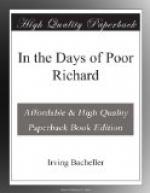“If we fight England, we got to have the Injuns on our side er else Tryon County won’t be no healthy place fer white folks,” Solomon wrote. “I wished you could go ‘long with me an’ show ’em the kind o’ shootin’ we’ll do ag’in’ the English an’ tell ’em they could count the leaves in the bush easier than the men in the home o’ the south wind, an’ all good shooters. Put on a big, two-story bearskin cap with a red ribband tied around it an’ bring plenty o’ gewgaws. I don’t care what they be so long as they shine an’ rattle. I cocalate you an’ me could do good work.”
Immediately the young man packed his box and set out by stage on his way to the North. Near West Point, he left the sleigh, which had stopped for repairs, and put on his skates and with the wind mostly at his back, made Albany early that evening on the river roof. He found the family and Solomon eating supper, with the table drawn close to the fireside, it being a cold night.
“I think that St. Nicholas was never more welcome in any home or the creator of more happiness than I was that night,” he wrote in a letter to Margaret, sent through his friend Doctor Franklin. “What a glow was in the faces of my mother and father and Solomon Binkus—the man who was so liked in London! What cries of joy came from the children! They clung to me and my little brother, Josiah, sat on my knee while I ate my sausage and flapjacks and maple molasses. I shall never forget that supper hour for, belike, I was hungry enough to eat an ox. You would never see a homecoming like that in England, I fancy. Here the family ties are very strong. We have no opera, no theater, no balls and only now and then a simple party of neighborhood folk. We work hard and are weary at night. So our pleasures are few and mostly those shared in the family circles. A little thing, such as a homecoming, or a new book, brings a joy that we remember as long as we live. I hope that you will not be appalled by the simplicity of my father’s home and neighborhood. There is something very sweet and beautiful in it, which, I am sure, you would not fail to discover.
“Philadelphia and Boston are more like the cities you know. They are getting ambitious and are beginning to ape the manners of England but, even there, you would, find most people like my own. The attempts at grandeur are often ludicrous. In Philadelphia, I have seen men sitting at public banquets without coat or collar and drinking out of bottles.”
Next day, Jack and Solomon set out with packs and snow-shoes for The Long House, which was the great highway of the Indians. It cut the province from the Hudson to Lake Erie. In summer it was roofed by the leaves of the forest. The chief villages of the Six Tribes were on or near it. This trail was probably the ancient route of the cloven hoof on its way to the prairies—the thoroughfare of the elk and the buffalo. How wisely it was chosen time has shown, for now it is covered with iron rails, the surveyors having tried in vain to find a better one.




